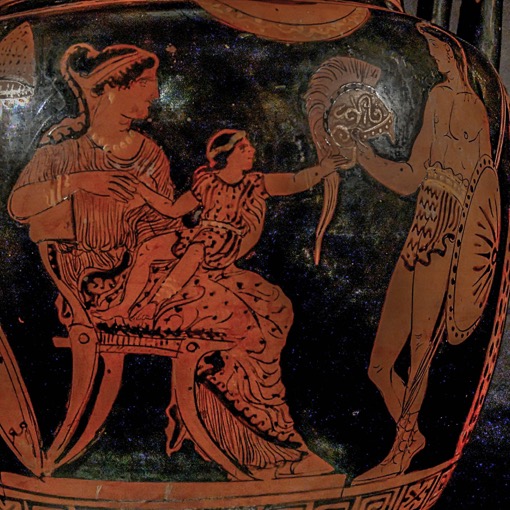In his recent Classical Inquiries posting, Gregory Nagy focuses on Iliad Scroll 6 and shares a sampling of selected comments with his readers. Nagy’s commentary will be incorporated into a larger, forthcoming project: A Homer commentary in progress.
I.06.289–292
tagging: variant readings; detours of Helen; pan-poikilo- ‘completely pattern-woven’
lemmatizing: παμποίκιλοι vs. παμποίκιλαThere are variant stories about detours experienced by Helen after her abduction by Paris. A trip to Sidon in Phoenicia is one such variant story. Besides the verses of I.06.289–292, which represent a longer variant reading, I posit also a shorter variant featuring one verse only, I.06.289 minus I.06.290–292. In terms of such a one-verse variant, no detour of Helen is mentioned here, and the reading for the epithet describing thepeploi ‘robes’ would then be pan-poikiloi = παμποίκιλοι instead of pan-poikila = παμποίκιλα. Both variants of this adjective pan-poikilo- mean ‘completely pattern-woven’. In terms of the longer variant, the peploi ‘robes’ stored in the chest were pattern-woven by Phoenician women; in terms of the posited shorter variant, by contrast, these robes presumably would have been pattern-woven by Trojan women or even by Helen. Herodotus (2.116.1–2.117.1) argued that the longer variant was truly Homeric in its grandeur, contrasting it with the shorter variant that he knew from the epic Cypria of his day. The historian treats the unaugmented story of a direct voyage of Paris and Helen from Sparta to Troy as a foil for the augmented story of their Phoenician detour. The poet of the unaugmented story, as Herodotus sees it, is a foil for Homer as the rightful poet of the augmented story. [[GN 2016.08.04 via HPC 271; see also PH 420.]]
In this posting, Professor Nagy experiments with two additional features that will be built into AHCIP. Continue reading on Classical Inquiries to find out more.

